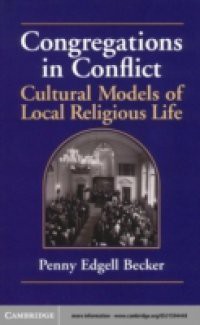Congregations in Conflict examines the nature of American congregations as institutions, looking in particular at how they deal with conflict within their ranks, to gain insight into religious culture, or the moral order of local religious life. In detailed and well documented case studies of conflict in twenty-three congregations Becker examines such factors as organizational processes, the extent and types of ties between church members, their shared understandings about mission and identity, and level of public commitment. From these factors, the author develops four models of local religious cultures, each of which emphasizes different aspects of the mission imperatives that broadly characterize American religion - to reproduce an historic faith, to provide a caring community of believers, and to witness. Becker finds vital 'public religion': congregations that provide caring and support for members, service to the local community, and important arenas for moral debate and public activism.

